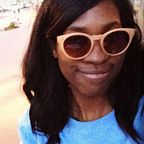What’s good, Medium? Goodbye Atlanta edition
11–2–16
Atlanta’s finale was last night and everyone is in their feelings about it. Here are the best Medium takes on the show’s record-breaking first season.
There are obviously going to be some spoilers in the post.
Joshua Adams breaks down the way Atlanta masters “double talk” and the perforative nature of Black identity:
Glover and crew have spawned a brilliant show that undercuts the idea of a black monoculture. It shows an array of black people’s dreams, contradictions, philosophies, neuroses, common sense, and sense of humor on mainstream display. But it would be unwise to assume that every joke is made for mainstream consumption. Some of Atlanta’s comedic genius is more readily understood to viewers privy to not only millennial pop culture, but also black millennial culture. And even Glover saying “I wanted to show white people, you don’t know everything about black culture” is actually a form of double talk.
So think of Atlanta as a gumbo of black experiences. If you do not know what “gumbo” is, what it’s made of, or why gumbo exists in the first place, that’s okay. That knowledge isn’t necessary to gauge if it tastes good to you — or not.
Duke Harten on Atlanta and race relations:
Which is much of what “Atlanta” does, really: It proves that black culture — and by extension, black people — are just as varied and nuanced as its (or their) white counterparts. Glover’s hero Earn is a loving father, an aspiring entrepreneur and a bit of a nerd. He’s non-violent, non-confrontational, even a bit of a wimp sometimes.
The rapper archetype is deconstructed here, too: Paper Boi, a drug-dealing amateur rapper, looks and acts the tough guy. (In the series’ first scene, after all, he pulls a gun on someone.) But as we get to know Alfred “Paper Boi” Miles, we realize he’s just an insecure young man doing what he can to survive.
Micah Peters sums up how Atlanta represents a new way of depicting racism on screen:
While the show does deal with capital-R racism — the Clint Eastwood–looking cop beating the mentally ill man within an inch of his life in the second episode — it also lowers the bar for what it normally takes for racism to be explored on television. Instead of hate crimes committed by dudes with a single brain cell and two first names in the way of burning crosses and such, Atlanta hardly presents anyone as obviously racist. Those people are out there. But what of the generally well-meaning white people who commit racial microaggressions in everyday life? Like Headass White Henley Dude and his dumb Flo Rida story. Like Janice mistaking Earn for “Alonso.” Like Craig being outdone that Earn, as a black person, had never been to Africa. “You gotta go man,” he says.
When you’re black, you encounter bullshit like this on a fairly regular basis.Atlanta shows you that you’re neither crazy, nor alone, and that even with all of that bullshit, being black is still pretty fucking tight. And being broke? Well, it’s not as good as not being broke, but it isn’t the end of the world.
The Ringer crew rounds up their favorite scenes from the show.
K. Austin Collins’s favorite scene? Hot wings and “don’t fuck up” as a symbol of Black love:
This wasn’t necessarily my favorite moment — but it was the scene that made me realize what was at stake on Atlanta. Episode 2, at the BBQ joint. The chef hooks Paper Boi and Darius up with lemon-pepper chicken with the sauce — and extra blue cheese. They don’t normally do that, he says, but he believes in Paper Boi: “It’s good to see a rapper that’ll just blow a nigga’s brains out on these streets. That’s that ’90s shit!” It’s a moment that’s hard to explain unless you’ve experienced it: it’s what black love often looks like. It’s communal, it comes out of nowhere, it often involves making someone food, and it carries an implicit (or in this case explicit) command: Don’t fuck up.
Goodbye to Earn, Van, Paperboi, and Darius! Goodbye to drug test anxieties and Saturday mornings spent passing time in bookings. Goodbye Black Justin Bieber. Goodbye boogie Juneteenth parties.
But most of all…
